IoT
Latest

Samsung brings Knox security to smart fridges and TVs
Samsung's Knox security is no longer limited to running on phones and tablets. The company has announced that it's integrating Knox across its connected devices, including TVs, appliances and even digital signs. As on mobile gear, it combines hardware and firmware updates to catch attempts to compromise a device.

Samsung's 2018 4K TVs add Bixby AI
Even if you can't spring for an 85-inch 8K TV or a screen large enough to be called The Wall, Samsung still has something new for your next TV. Its 2018 Smart TV platform is getting an upgrade with the addition of its Bixby AI voice control platform, as well as integrated with its SmartThings smart home platform. That home automation hub support will "offer easier sharing, connectivity, and an overall simplified way to control the television and sync with other devices," according to the company. As Samsung explained during its launch event on Sunday at CES, it's replacing all of the current mobile apps with one SmartThings app, that will help you login to services, set up WiFi on your new TV, and more. Finally, a new universal guide will keep up with the likes of Apple, Roku and TiVo by searching for content within apps and suggesting new things you to watch.

Don’t pirate or we’ll mess with your Nest, warns East Coast ISP
Internet slowdowns at home aren't just annoying anymore. They can be hazardous to your health or dangerous if you're in an area that freezes. Internet service provider Armstrong Zoom has roughly a million subscribers in the Northeastern part of the U.S. and is keen to punish those it believes are using file-sharing services.

Buoy uses AI and machine learning to keep your water bills low
Buoy is a device that puts machine learning to work to save on your water bill. The IoT device connects to your home's WiFi network and water supply to monitor how much is going where on a use-by-use basis (faucet shower, washing machine, etc..), in real time. It uses algorithms to measure water usage and suss out leaks, and will deliver alerts to your mobile device when one is detected. From there, you can even do a remote shut-off so the basement won't be flooded when you get home.

Vodafone branches out into internet of things things
The UK's major carriers have mobile all sewn up, and after a bit of broadband here and TV there, they're turning to other things to get their kicks, grow their brands and pad their bank accounts. For O2, that meant moving into smart home gear, and for Vodafone, that means launching a range of internet of things (IoT) devices under the banner "V by Vodafone." Available to Vodafone customers in the UK and a handful of other European countries from today is a car telematics dongle, pet tracker, bag tracker and connected camera, with more products due to join this launch lineup next year.

Wink's $200 home security bundle includes three sensors and a hub
Wink's mission (before and after getting bought by Will.i.am) has been to make smart product networks work simply and easily with its proprietary hub, and added Google Home and Alexa integration to boot. Accordingly, most of its earlier bundles, like its smart light bulb home safety package, have included other companies' products. But its latest is a collection linking its hub with three new Wink sensors for a holistic security bundle.

Google and others back Internet of Things security push
Rather than becoming ubiquitous in homes as expected, the Internet of Things (IoT) has become the butt of jokes, in part because of major security and privacy issues. UK mobile chip designer ARM -- which created the architecture used by Qualcomm, Samsung and others -- has a lot to lose if it doesn't take off. As such, it has unveiled a new security framework called Platform Security Architecture (PSA) that will help designers build security directly into device firmware.

Bixby 2.0 and Project Ambience push Samsung's vision of connected devices
To compete with the likes of Google Assistant and Amazon's Alexa, Samsung has to get its own version of a smart voice-powered assistant, Bixby, to as many devices as possible. It also needs to make Bixby work as well as its competitors, something Samsung has had trouble with since launch. At the Samsung Developer Conference in San Francisco on Wednesday, the tech company announced two initiatives that will do just that: Bixby 2.0 and Project Ambience.

Super-thin edible sensors can monitor food temperature
Biomaterials that are rigid in form but able to degrade safely are everywhere. You can find tech like this in medical implants, environmental sensors and wearable, disposable devices. What's harder to do, though, is to make sensors that you can digest. That's exactly what Swiss researchers in Zurich have created, though: a thin, edible sensor that can attach to food and wirelessly report on its temperature. Now our fruits and vegetables can be part of the Internet of Things.

Yomee turns dissolvable culture pods into fresh yogurt
Yogurt is at its best when it's freshly made and additive-free, which is why the more health-conscious folks prefer making this tasty snack at home instead of buying it. But yogurt-making is a messy job: you have to first heat the milk up to at least 161°F or 72°C for pasteurization separately, as pretty much all yogurt makers can't reach that temperature; and you also have to measure how much bacterial culture to put in. This is where Food-X-backed Hong Kong startup Lecker Labs comes in. Its first product, Yomee, is a machine that takes care of the entire yogurt-making process, covering high-temperature heating (reaching 185°F or 85°C), stirring, culture loading, fermentation and chilling (down to 50°F or 10°C). When ready, simply pop the cup out and enjoy.
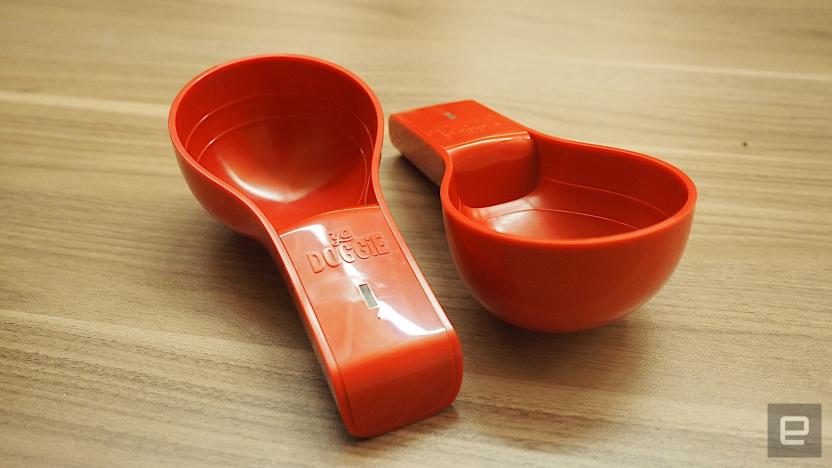
Ya Doggie solves the pet food problem you didn't know you had
The adage that "dogs grow to resemble their owners" is not much of a compliment anymore in America -- namely because it portends that our pets will become as portly as their people. In fact, as CBS News reported earlier this year, a third of American dogs are considerably heavier than they should be and it's shortening their lifespans. However, a smart pet food scoop from Santa Cruz, CA-based Ya Doggie promises to not only help establish better feeding habits but also save you from kibble runs.
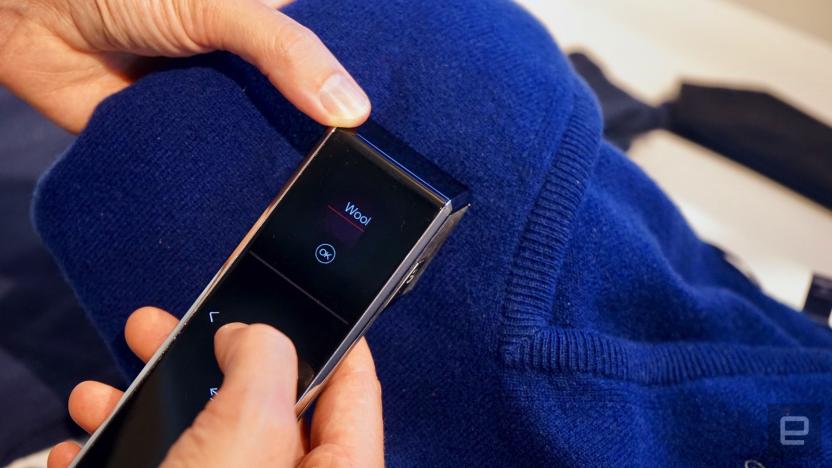
Bosch's stain scanner knows what you spilled on your shirt last night
German technology giant Bosch is mostly known for making home appliances. And at IFA 2017, the company is showing off a concept that it hopes can add a new dimension to those products. The X-Spect is a portable device that detects fabric composition, scans stains and figures out what your food is composed of. As pictured above, it looks a lot like a TV remote, and it features a tiny screen and capacitive touch buttons that let you browse through menus. Right now, Bosch is demoing the X-Spect, which weighs a mere 200 grams (less than half a pound) alongside one of its WiFi washers to deliver "optimal" cycle recommendations.
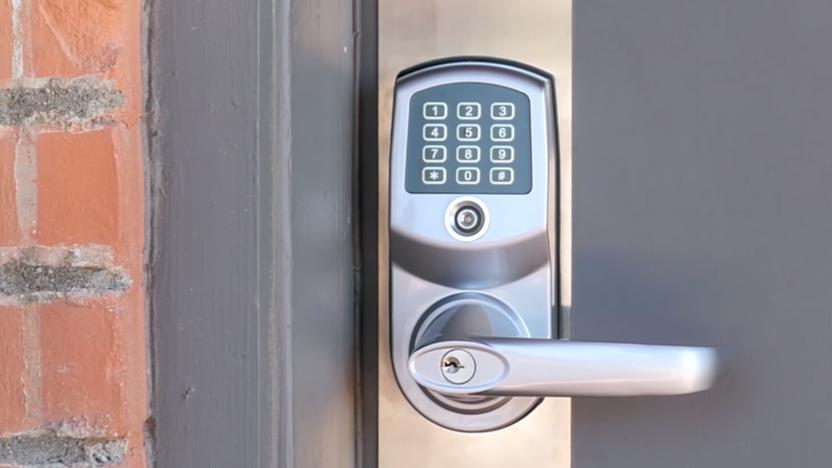
Smart locks rendered dumb by automatic update fail
Making dumb things smart can have its benefits, but adding complexity to once-simple devices can also lead to unforeseen problems. It's a lesson smart lock maker LockState is all too aware of, after a clumsily delivered automatic update bricked hundreds of the gizmos, rendering their fancier features like remote locking and unlocking unusable.

IKEA smart lights will play nicely with Apple HomeKit this fall (update)
IKEA's Tradfri smart lighting line is an impressive system at a relatively affordable price point, and it just got even better. Earlier this year, IKEA announced that it would be integrating Tradfri with Apple's HomeKit. Today, the Swedish furniture company pushed an update to all existing hubs that does just that. What's more, Ikea bulbs will now work with Philips devices, meaning you don't have to buy an IKEA hub if you have a Hue Bridge compatible with HomeKit. Bulbs will come in multiple colors starting in October.

Tile Pro helps you find your stuff from 200 feet away
We've held up the Tile as the best Bluetooth-connected fob to keep track of your stuff since its second, refined version launched in 2015, and more recent versions have gotten better and smaller. The latest additions to the lineup released today, Tile Pro, respond from 200 feet away, twice as far as older models -- and both new gadgets are waterproof, too.
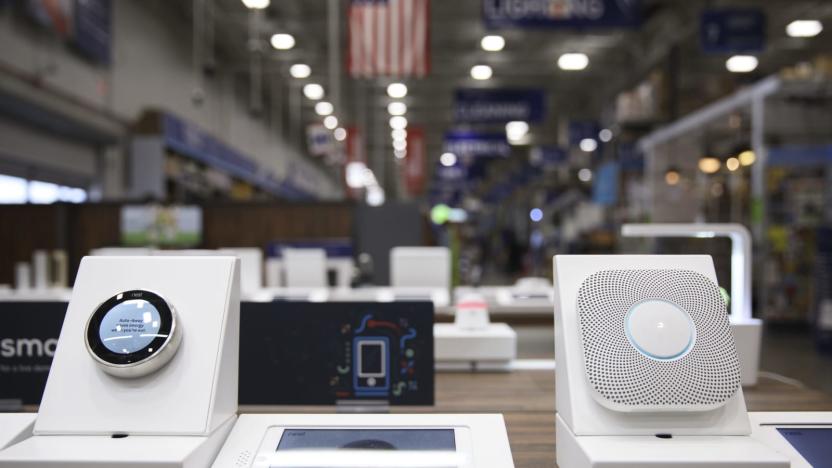
Senate bill demands tougher security for the Internet of Things
Security among Internet of Things devices is bad enough at home, but it's downright scary in government, where a vulnerable security camera could lead to hackers stealing vital secrets. A bipartisan team of US senators wants to reduce the chances of ever happening. They're introducing a bill, the Internet of Things Cybersecurity Improvement Act, that mandates a base level of security standards for any IoT gadgets used in government. The would-be law is there mostly to ensure that vendors don't get away with rookie mistakes that leave their devices wide open to attack.

Bluetooth mesh networking could connect smart devices city-wide
Bluetooth is one step closer to connecting smart devices on a large scale. The wireless standard's Special Interest Group (SIG) has announced support for mesh networking. With the new technology, manufacturers can build devices that can all talk to one another, from smart street lighting to transportation.

Take HomeKit devices for a spin at a handful of Apple Stores
As a mark of just how serious Apple is about its smart home initiatives, the company has built HomeKit into 46 of its brick and mortar stores. That means if you stop into the Union Square location in San Francisco or the World Trade Center and Williamsburg stores in New York you'll be able to give the IoT suite a test run, TechCrunch writes. Some 28 other stores throughout the country will have the demos up and running. If you don't have one of the fancy stores, you'll have to settle for non-interactive literature and the like. Ugh.

Intel has less competition against Raspberry Pi
Say goodbye to Intel's Edison, Joule and Galileo compute modules. The company has unceremoniously canceled its developer kit lineup, which were meant to give it a foothold in the burgeoning Internet of Things arena, ZDNet reports. Additionally, Intel also canceled several of its Recon Jet smart glasses products, though that's less of a surprise. With Galileo, Intel wanted to compete directly against the ARM-powered Raspberry Pi, while Edison shrunk down a full development kit to the size of an SD card. Joule, which launched last year, was its most powerful compute module yet.
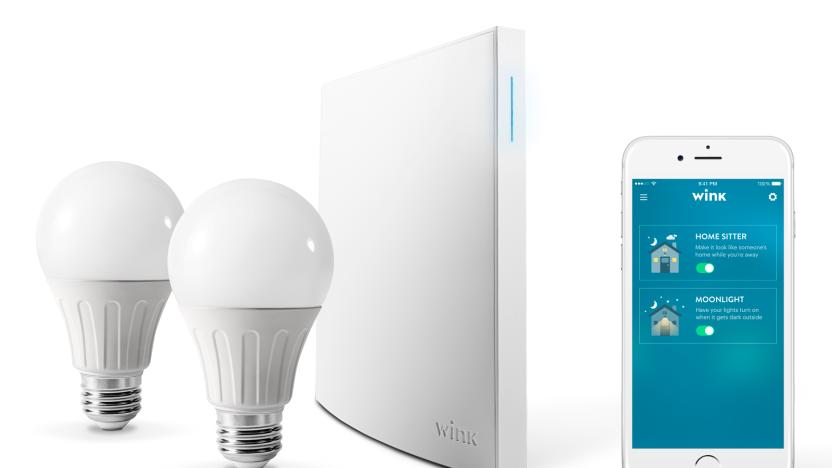
Wink promises home security with its $119 smart bulb bundle
Wink's goal is to demystify the internet of things with a single hub and a single app that talks to all manner of smart home devices from other companies, and plays nice with Google's assistant and Alexa too. Knowing that most people are still unsure of where to start modernizing, Wink has today announced a new basic smart lighting bundle for $119 that includes its latest smart home hub and two dimmable, connected bulbs from Sylvania. The "Wink Bright" proposition is two-fold, however, as the company is also updating its mobile app to add a few no-nonsense features to show there's more to smart bulbs than not having to move from the sofa to set the mood.













